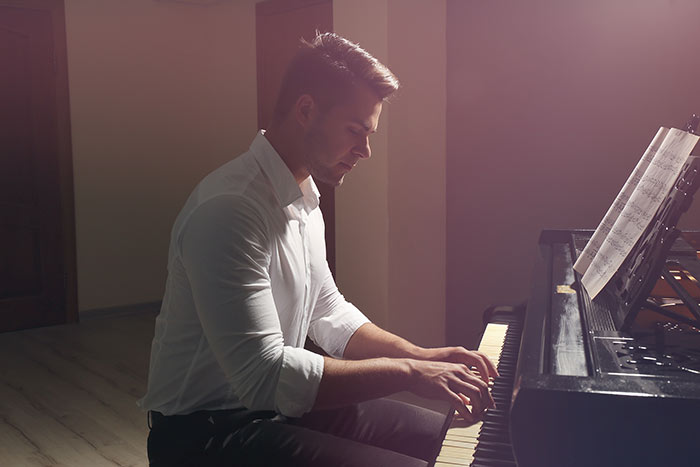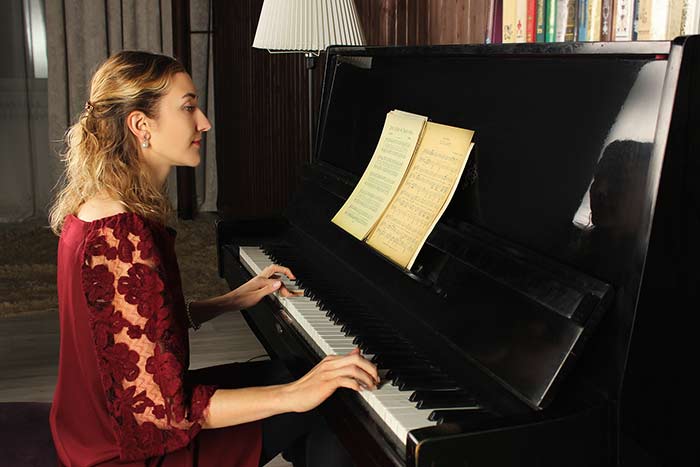Well… It is probably the most challenging question that I have ever had to answer.
Most adults who contemplate learning how to play the piano, or who have already decided to start, have the same question in mind: “How long does it take to learn piano?”
It depends
Every time an adult asks me this question, I give the same reply: “It depends”. It depends as it depends on various factors: your exact goal, your natural ability, the amount of time you dedicate to personal practice and the instructor you are studying with.
As you may have probably understood, it is a question that cannot be answered unless one has all the data.

Let’s look at a few potential scenarios
Scenario number 1
You attend your piano lessons every fortnight or less, you only touch the piano once or twice at home, you have a poorly experienced instructor.
This scenario will, sadly, not take anyone very far. Let me explain to you why.
As a beginner, it is essential to attend your piano lessons weekly (as a minimum) to ensure that you are taking the right habits and do not head into the wrong direction in between your lessons. At the start, being well supported and guided regularly is extremely important. In addition to helping you going through the basics quickly, it will also increase your motivation and, therefore, encourage you to get to the next level quicker.
Unless your goal is to play “Twinkle Twinkle Little Stars” with one hand only, which will take you a few minutes only, learning how to play the piano requires daily personal practice. If you think about it, why would it be different from any other activity? Can you know how to speak Japanese in a day? Can you learn how to play golf proficiently without practising? The answer is no. You cannot learn how to play the piano by attending your lessons only. If you are relatively talented, it might be OK at the very beginning, and you might see some improvement, even if you have not touched the instrument for a few days, but believe me, it is not going to last. If you take this approach, you can be assured to waste your time, your money and your teacher’s time. If you are not prepared to put some time in daily, or at least every other day, you are not going to go anywhere. You should only take this activity on if you are willing to put time and effort into it.
Learning how to play the piano with an instructor who does not have any experience (or just a little) in adult piano education is not recommended. Do your homework and do some research before starting your piano lessons. Many individuals claim to be piano teachers as they can play the piano, but only a few know how to pass their knowledge on to adults and suitably guide them. To increase your chance of success, it is essential to study with an experienced piano instructor who follows a structure and who is used to teaching adults.
To summarise, scenario 1 is the perfect example of a recipe for disaster. If you intend to approach piano playing in that fashion, I am sorry to say that it would be better not to start.
Scenario number 2
You attend your piano lessons weekly, you practice relatively well in between your lessons, your piano instructor has not much experience with adults.
Scenario 2 is a little better as you get input regularly, and you are diligent in your practice. But unfortunately, if your instructor does not teach you correctly, you will learn in the wrong way, pick up bad habits and end up giving up. You might lose your motivation due to the lack of progress. Even if you are the most dedicated individual, this scenario shows us that if one of the elements is missing, it will prevent you from succeeding greatly.
Scenario number 3
You attend your piano lessons weekly, you practice daily for 1hr or more, you study with a fantastic piano teacher who knows exactly how to take you from point A to point B
It is starting to sound better as you now have all the odds in your favour! You are attending your piano lessons regularly, you dedicate 1hr or more to daily practice, and you learn from a brilliant piano instructor who specialises in teaching adults. What a perfect combination!
Both scenarios 1 and 2 will not take you to where you want to be, while scenario 3 sets you on the right path and gives you much more chance to succeed.
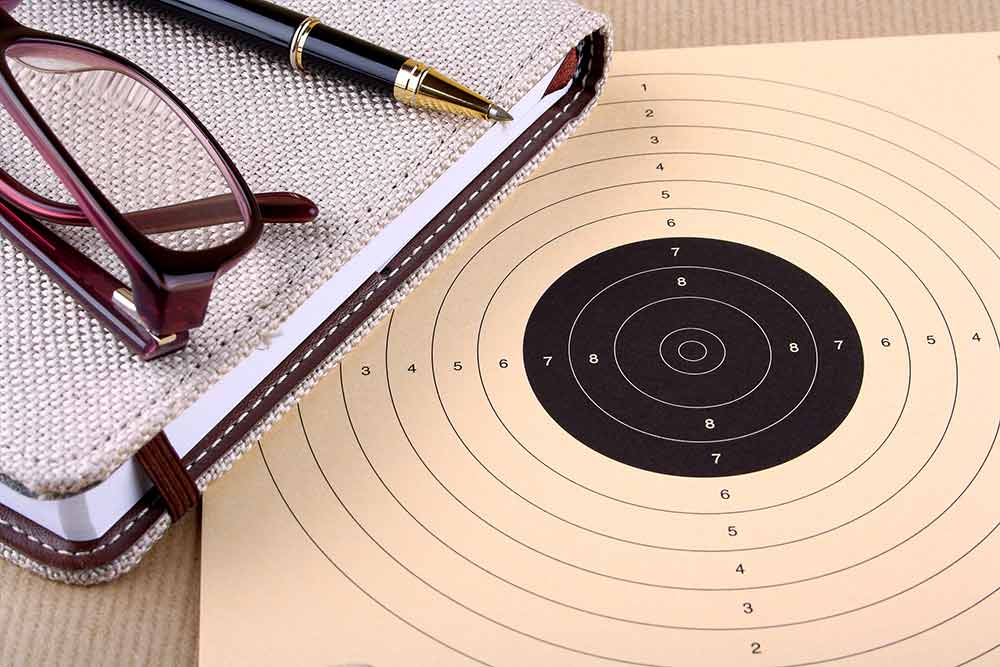
What is your exact goal?
Let’s get back to the initial question “how long does it take to learn piano”. By now, you have understood that you must attend your piano lessons weekly with a fantastic instructor and practise in between your lessons to achieve your goal.
But what is your goal?
Most adults say that they do not aim to become concert pianists and that they just want to play for the pleasure. It is a good idea not to claim that you want to become a concert pianist as it takes 20 years + and the daily practice of 8 to 12 to get there. Playing for pleasure is a wonderful endeavour, and I can only encourage all piano enthusiasts to take it on.
However, “playing for pleasure”, is a too vague goal. It is as vague as saying that your ultimate goal is to be happy. Once again, various factors come into place. What exactly do you want to play for the pleasure and how well or badly do you want to play these pieces for the pleasure?
I do not think I have ever met an adult beginner who wants to learn how to play Brahms or Liszt’s concerti for the pleasure. I believe that they understand the difficulty of this task and that it is reserved for the most proficient pianists. I did not say that amateur pianists cannot play these incredible pieces of the repertoire. I mean that it will require several hours of practice daily, and approaching these pieces is not for everyone. As they are aware of this fact, somehow, adult beginners lower their goals and talk about Mozart, Chopin or Einaudi. Do you know how difficult it is to play any pieces written by these composers well or even badly?
Some adults realise it along the way and go for easy arrangements of their favourite pieces. It is an excellent option, as several books are now available on the market and it can allow you to enjoy playing your favourites. Playing the original versions, however, should not be approached at the early stage of your piano education. You should, at least, wait a few years before studying them. (I am talking about the most accessible pieces by these composers).

Take your time and do not skip any step
When I started my career as a piano instructor, at about 18 years old, I did not always know how to handle some extraordinary requests. One of my students just started his piano lessons as an absolute beginner with no musical background, whatsoever. After a few lessons only, while he was still barely able to play with both hands simultaneously, he came to his session with a new piano score that he was incredibly proud to show me. He decided to tackle “Claire de Lune” by Debussy as he was bored with learning how to read notes and work on simple coordination exercises.
You might think that it is so ridiculous that I might be making it up! Sadly not…
He explained that he was incredibly frustrated with the pieces that he had to study and that he was about to give up unless we would approach more interesting works of the repertoire.
If such a gentleman came to me now, I would explain kindly all the reasons why it is a terrible idea, but I did not know how to handle it at the time.
What happened next is pretty obvious: He spent weeks trying to play the first system and gave up piano playing as he was not satisfied with his progress. The whole process was too slow!
It was so slow that it became inexistent!

Piano playing is a journey, not a destination
You know, I think that you should not ask the question “how long does it take to learn piano” before starting your piano lessons. Do not begin with the wrong thoughts and ideas in mind. You can certainly ask “how long does it take to go from London to New York”, but you should not wonder how long it takes to learn how to play the piano.
I have met a student once who set the goal to train and run the marathon after a year. After this goal was accomplished, he set a new goal, for the following year, which was to learn how to play the piano. Unfortunately, he did not start with the right mindset. He was extremely tense and impatient. He was regularly going backwards instead of going forward. He kept doubting the most obvious advice as he was looking for a magic trick. He wanted to achieve his goal so fast (within a year) that he used to memorise the pieces to make it easier to play them or use various other tricks to progress more quickly. Sadly, this technique of skipping steps does not work in piano playing, and you will surely fail quicker than you can imagine. This poor man, who could have done very well over time, ended up quitting.
As adults, we are all a bit impatient, and we want to see results quickly. Unfortunately, piano playing cannot be approached in that way.
If you want to learn how to play the piano, you should embark on the journey, with no deadline or ultimate piece to be able to play on a specific date, as it can only lead to frustration and disappointment.
One of my other students, who never played the piano before, wanted to learn a piece by Einaudi to surprise her husband a few months later. I accepted to help, but I had to show her the keys she had to press on for her to be able to play it. You can use this method to play one piece only, as long as it is achievable technically for a beginner, but it is undoubtedly not the way to learn how to play the piano. We could call this the “parrot method”. As I said, it could work, but it would be equivalent to know a few sentences in a foreign language. You could say these specific sentences, but it cannot take you far since you are not able to say anything else!

Do not engineer your own disappointment
Yes, learning how to play the piano as an adult can be frustrating at times. It is not disappointing or discouraging because there is something wrong with you or because it is so impossible. It feels disappointing as you set your expectations too high, and you want to achieve your ultimate goal too quickly.
You have two issues at hand: the time frame and your understanding of the difficulty. Both are wrong, and it results in you thinking that you are not good at it or that there is something wrong with your instructor.
When starting your piano lessons, you should begin with the right mindset. You should see it as a long-term project and accept the setbacks and plateau that are inevitable.
It takes approximately ten years for a child of six years old, who would practise several hours a day, to get to a professional standard and an extra ten years to polish his playing to become a concert pianist. I am only talking about technical abilities here as being a true artist could take much longer.
If it took so long for the pianists who perform in some of the most prestigious concert halls, why would you be able to get to the same results in a few weeks only?
I know that you do not expect to become an internationally acclaimed artist but do not underestimate the difficulty of piano playing. Even pieces that could sound easy to play are much more complicated than you may think. I am thinking of Mozart’s Easy Sonata, for example. It sounds easy, and it looks easy, but it is not. It is complicated as each note must be crystal clear, and it requires excellent control of each of your fingers. Besides, the lack of notes on the score makes the interpretation incredibly arduous. What I mean by that is that the more straightforward it looks the hardest it could be!
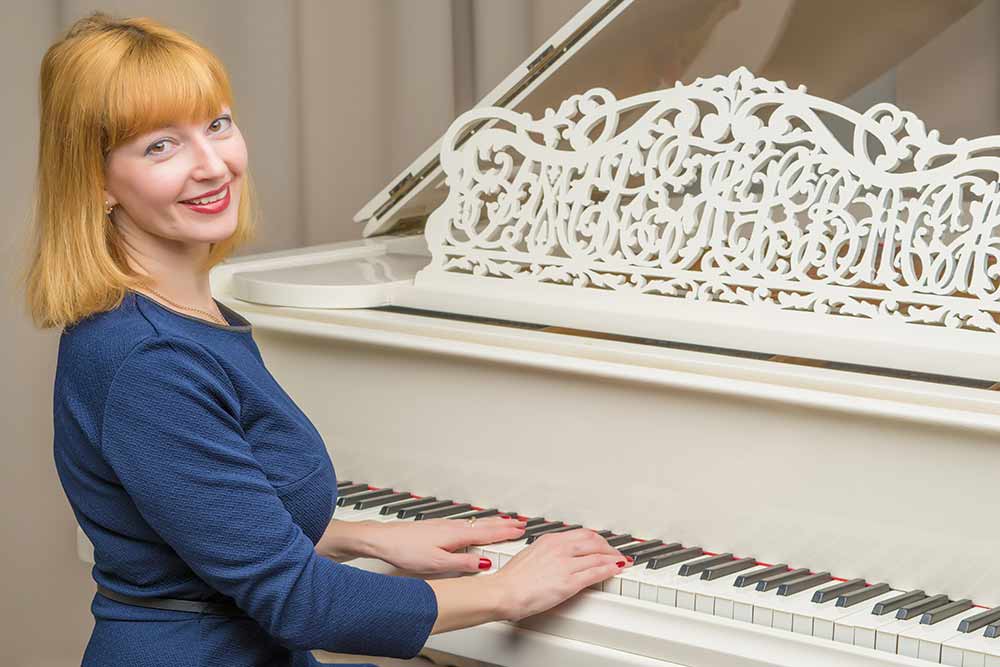
Here is my advice if you want to be successful at piano playing:
Instead of wondering how long it will take, make sure to study with an excellent instructor who specialises in teaching adults and who can understand your goals, needs and mindset. I am insisting on that aspect as understanding adults who play for the pleasure, and knowing how to teach them appropriately is not as straightforward as it seems. Instructors who specialise in this field know how to make you progress without expecting the same result as they would from a future professional pianist. He or she will understand that you have a limited amount of time to dedicate to personal practice and that your ultimate goal is not to have everything perfect. Your ultimate goal is to perform your favourite pieces relatively well and enjoy doing it!
Practise daily. Practising every day is essential to your success, even if you only manage to sit at the piano for a few minutes each day, as a beginner. Playing every day will help you get familiar with the instrument and the piano notation. Believe me, not touching it all week and practising extensively over the weekend does not work. You must be prepared to go to the instrument every single day. Even for 5 minutes, in the worst-case scenario. If you are truly dedicated, I am sure that you can wake up 5 minutes earlier or go to bed 5 minutes later.
Follow the advice of your instructor. If you study with a professional pianist who specialises in teaching adults, such as at The London Piano Institute, you can trust your teacher 100%. All our piano teachers are carefully selected for their exceptional understanding of the instrument, their fantastic performance skills and their unparalleled ability to pass their knowledge on. They perfectly know what you should be working on, which piece you should be playing at each given stage of your development and which exercises will help you resolve any technical or musical difficulties.
My colleagues and myself have been baffled on various occasions by the attitude of some absolute beginners who disagree with the methods used or criticise the approach. How can it be? Would you tell Roger Federer that the way he handles his tennis racket is not right or would you say to Tiger Wood that you disagree with his swing technique? You would not dare as it would not make any sense. So why would you argue the advice given by your piano instructor who is also an exceptional pianist?
Do not think that your issues are unique. Our instructors have years of experience in playing and teaching the piano, so they perfectly know what works or not. If you have not succeeded yet, it is not because the advice is wrong. It is surely because you have not dedicated enough time or you have not applied the technique is the correct manner.
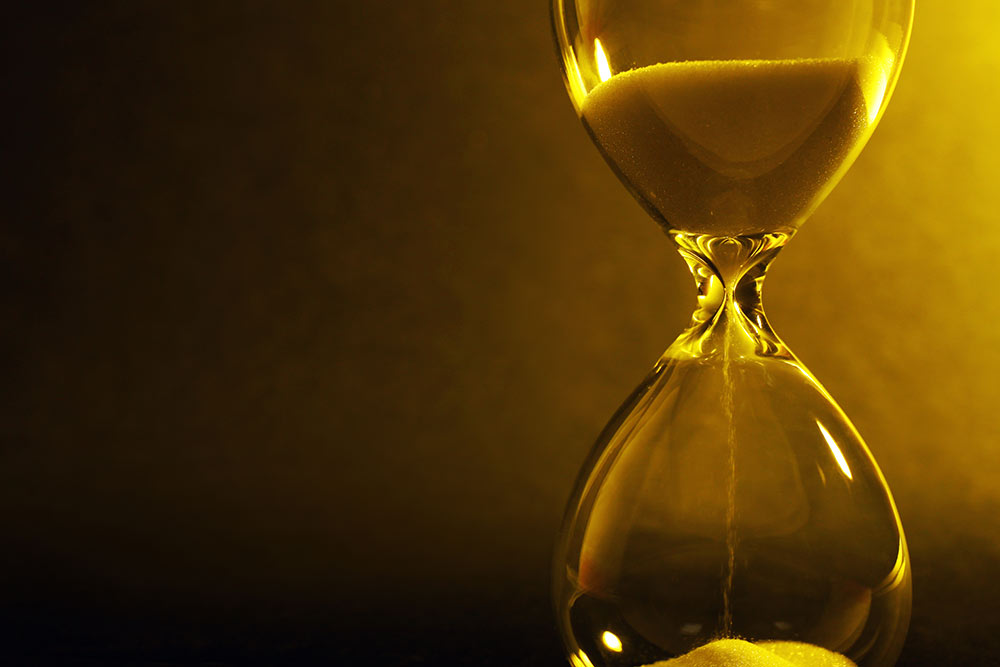
Keep your eyes on the price but focus on the work at hand
As a beginner, you certainly need to dream to get the courage necessary to get to the next level. I am not going to hide that there will be some setbacks and plateau. It is normal for everyone, even for the greatest pianists of all times. They did not get there in one straight line! It is advised to listen to piano performances as often as you can but do not try to get there in a day. The best way to make progress regularly without being frustrated or annoyed is to accept failures and do the work that is on your desk as well as you can in between each of your piano lessons. Skipping steps can only be detrimental.

Do not give up
Not giving up sounds obvious, but it is what happens to most adult beginners. They give up as soon as there is difficulty or as soon as they start. They are happy at the very beginning as things are relatively straightforward and easy to achieve, but as soon as they need to make an effort and conquer a difficulty, they give up. You might think it is ridiculous to stop after having mastered the basics, but it is sadly the case for most adults who once dreamed of learning how to play the piano. At The London Piano Institute, we have met hundreds of men and women who sign up to make their dream come true and play the piano relatively well. Sadly, only a few push through and become the pianist of their dream. What do these successful people have in common? Consistency. Consistency is the key to success. As a professional pianist and master piano instructor, I can assure you that it is true. Do not give up, do not give up, do not give up!

An easy trap to fall into
Another trap you could fall into is to put your course on hold for some personal or professional reasons. In twenty years +, I have heard this sentence “I need to put my course on hold” quite often. I do not know if it is because I am unlucky, but I have never seen a student coming back.
You should never put your course on hold for any reason. As I said earlier, playing the piano is a long journey, and several obstacles might come your way. If you are suddenly busier at work or some personal issues prevent you from practising as well as usual, it is okay. Practise a bit less but maintain your knowledge, attend your lessons (even for shorter durations) but do not put your course on hold. If you do not find the time to go to the music school, why not attend online? The technology is so developed nowadays that it is a fantastic alternative in case your schedule gets too tight. To summarise, find a solution, but do not put your course on hold ever!
Conclusion
I have tried to answer your question “how long does it take to learn piano”. Unfortunately, as I said at the beginning, it is an impossible question to answer since several factors come into play. But do not be discouraged. If everything goes well, you should be able to play some nice and simple piano pieces within six months, as long as you follow my advice above.
The most important thing is not to rush anything or think of the question “how long does it take to learn piano”.
Just do your best daily, and you will be more successful than you could ever have imagined!



